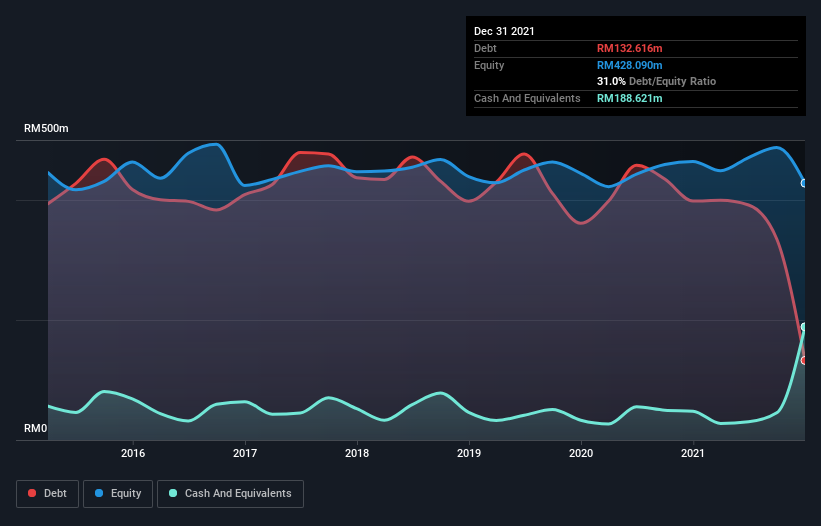- Malaysia
- /
- Commercial Services
- /
- KLSE:PBSB
Is Pelikan International Corporation Berhad (KLSE:PELIKAN) Using Too Much Debt?

Some say volatility, rather than debt, is the best way to think about risk as an investor, but Warren Buffett famously said that 'Volatility is far from synonymous with risk.' When we think about how risky a company is, we always like to look at its use of debt, since debt overload can lead to ruin. As with many other companies Pelikan International Corporation Berhad (KLSE:PELIKAN) makes use of debt. But should shareholders be worried about its use of debt?
When Is Debt A Problem?
Debt and other liabilities become risky for a business when it cannot easily fulfill those obligations, either with free cash flow or by raising capital at an attractive price. Part and parcel of capitalism is the process of 'creative destruction' where failed businesses are mercilessly liquidated by their bankers. However, a more frequent (but still costly) occurrence is where a company must issue shares at bargain-basement prices, permanently diluting shareholders, just to shore up its balance sheet. Of course, the upside of debt is that it often represents cheap capital, especially when it replaces dilution in a company with the ability to reinvest at high rates of return. The first thing to do when considering how much debt a business uses is to look at its cash and debt together.
Check out our latest analysis for Pelikan International Corporation Berhad
What Is Pelikan International Corporation Berhad's Debt?
The image below, which you can click on for greater detail, shows that Pelikan International Corporation Berhad had debt of RM132.6m at the end of December 2021, a reduction from RM398.2m over a year. But on the other hand it also has RM188.6m in cash, leading to a RM56.0m net cash position.

How Strong Is Pelikan International Corporation Berhad's Balance Sheet?
Zooming in on the latest balance sheet data, we can see that Pelikan International Corporation Berhad had liabilities of RM477.6m due within 12 months and liabilities of RM357.4m due beyond that. On the other hand, it had cash of RM188.6m and RM243.8m worth of receivables due within a year. So it has liabilities totalling RM402.6m more than its cash and near-term receivables, combined.
This deficit casts a shadow over the RM147.8m company, like a colossus towering over mere mortals. So we definitely think shareholders need to watch this one closely. At the end of the day, Pelikan International Corporation Berhad would probably need a major re-capitalization if its creditors were to demand repayment. Given that Pelikan International Corporation Berhad has more cash than debt, we're pretty confident it can handle its debt, despite the fact that it has a lot of liabilities in total.
Better yet, Pelikan International Corporation Berhad grew its EBIT by 343% last year, which is an impressive improvement. That boost will make it even easier to pay down debt going forward. There's no doubt that we learn most about debt from the balance sheet. But you can't view debt in total isolation; since Pelikan International Corporation Berhad will need earnings to service that debt. So when considering debt, it's definitely worth looking at the earnings trend. Click here for an interactive snapshot.
But our final consideration is also important, because a company cannot pay debt with paper profits; it needs cold hard cash. Pelikan International Corporation Berhad may have net cash on the balance sheet, but it is still interesting to look at how well the business converts its earnings before interest and tax (EBIT) to free cash flow, because that will influence both its need for, and its capacity to manage debt. Looking at the most recent three years, Pelikan International Corporation Berhad recorded free cash flow of 23% of its EBIT, which is weaker than we'd expect. That's not great, when it comes to paying down debt.
Summing up
While Pelikan International Corporation Berhad does have more liabilities than liquid assets, it also has net cash of RM56.0m. And we liked the look of last year's 343% year-on-year EBIT growth. So although we see some areas for improvement, we're not too worried about Pelikan International Corporation Berhad's balance sheet. The balance sheet is clearly the area to focus on when you are analysing debt. But ultimately, every company can contain risks that exist outside of the balance sheet. These risks can be hard to spot. Every company has them, and we've spotted 3 warning signs for Pelikan International Corporation Berhad (of which 1 is concerning!) you should know about.
If, after all that, you're more interested in a fast growing company with a rock-solid balance sheet, then check out our list of net cash growth stocks without delay.
New: Manage All Your Stock Portfolios in One Place
We've created the ultimate portfolio companion for stock investors, and it's free.
• Connect an unlimited number of Portfolios and see your total in one currency
• Be alerted to new Warning Signs or Risks via email or mobile
• Track the Fair Value of your stocks
Have feedback on this article? Concerned about the content? Get in touch with us directly. Alternatively, email editorial-team (at) simplywallst.com.
This article by Simply Wall St is general in nature. We provide commentary based on historical data and analyst forecasts only using an unbiased methodology and our articles are not intended to be financial advice. It does not constitute a recommendation to buy or sell any stock, and does not take account of your objectives, or your financial situation. We aim to bring you long-term focused analysis driven by fundamental data. Note that our analysis may not factor in the latest price-sensitive company announcements or qualitative material. Simply Wall St has no position in any stocks mentioned.
About KLSE:PBSB
PBS Berhad
Manufactures and distributes fine writing and stationeries in Malaysia, Singapore, China/Taiwan, Thailand, Greece, and internationally.
Excellent balance sheet slight.
Market Insights
Community Narratives




